Prayer in a Time of Isolation By Bryce Wiebe

Scripture Readings on Wisdom
Proverbs 12:15 (NLT)
Mockers hate to be corrected, so they stay away from the wise.
Psalm 37:30 (NLT)
The godly offer good counsel; they teach right from wrong.
Proverbs 3:7 (NLT)
Don’t be impressed with your own wisdom. Instead, fear the LORD and turn away from evil.
Introduction by David Anderson
As we gather to worship today, you’ll notice that most of this worship service contains voices other than mine. I have been weaving multiple voices into many of our worship services during this time of pandemic, racial unrest, and season of increased political divisions. I learn the best when I listen to the wisdom of others instead of myself. I know that sounds silly to say, but I am ashamed at how often I speak on topics I don’t really have much knowledge in, and assume I am right, just because I thought it or said it! I repent of that.
A mentor of mine once said,
All of us preachers pretty much just preach one or two sermons over and over again.
This is another reason I find it important to create space for multiple voices in our worship services. We miss out on the abundance of God’s gifts and talents when we relegate the pulpit or the microphone to one person every Sunday.
So I hope and pray that you will learn alongside me as we listen to voices God has gifted with insight, humility, prophetic power, wisdom and deep love for Jesus’ Church.
In a world that feels upside down, discombobulated, and bubbling with tension and hope, I offer you this meditation from Brian Zahnd. May it challenge you and bless you during this time of worship.
My Problem With the Bible
By Brian Zahnd
I have a problem with the Bible. Here’s my problem…
I’m an ancient Egyptian. I’m a comfortable Babylonian. I’m a Roman in his villa.
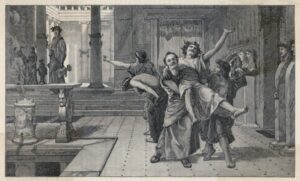
That’s my problem. See, I’m trying to read the Bible for all it’s worth, but I’m not a Hebrew slave suffering in Egypt. I’m not a conquered Judean deported to Babylon. I’m not a first century Jew living under Roman occupation.
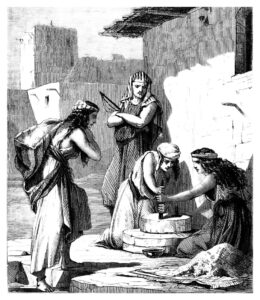
I’m a citizen of a superpower.
I was born among the conquerors. I live in the empire. But I want to read the Bible and think it’s talking to me. This is a problem.
One of the most remarkable things about the Bible is that in it we find the narrative told from the perspective of the poor, the oppressed, the enslaved, the conquered, the occupied, the defeated. This is what makes it prophetic.
We know that history is written by the winners. This is true — except in the case of the Bible it’s the opposite!
This is the subversive genius of the Hebrew prophets. They wrote from a bottom-up perspective.
Imagine a history of colonial America written by Cherokee Indians and African slaves.
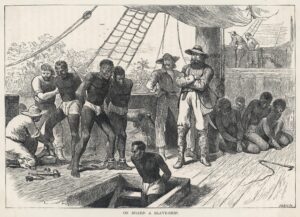
That would be a different way of telling the story! And that’s what the Bible does. It’s the story of Egypt told by the slaves.
The story of Babylon told by the exiles.
The story of Rome told by the occupied.
What about those brief moments when Israel appeared to be on top?
In those cases the prophets told Israel’s story from the perspective of the peasant poor as a critique of the royal elite. Like when Amos denounced the wives of the Israelite aristocracy as “the fat cows of Bashan.”
Every story is told from a vantage point; it has a bias.
The bias of the Bible is from the vantage point of the underclass. But what happens if we lose sight of the prophetically subversive vantage point of the Bible?
What happens if those on top read themselves into the story, not as imperial Egyptians, Babylonians, and Romans, but as the Israelites?
That’s when you get the bizarre phenomenon of the elite and entitled using the Bible to endorse their dominance as God’s will.
This is Roman Christianity after Constantine.
This is Christendom on crusade.
This is colonists seeing America as their promised land and the native inhabitants as Canaanites to be conquered.
This is the whole history of European colonialism.
This is Jim Crow.
This is the American prosperity gospel.
This is the domestication of Scripture.
This is making the Bible dance a jig for our own amusement.
As Jesus preached the arrival of the kingdom of God he would frequently emphasize the revolutionary character of God’s reign by saying things like,
the last will be first and the first last.
How does Jesus’ first-last aphorism strike you? I don’t know about you, but it makes this modern day Roman a bit nervous.
Imagine this:
A powerful charismatic figure arrives on the world scene and amasses a great following by announcing the arrival of a new arrangement of the world where those at the bottom are to be promoted and those on top are to have their lifestyle “restructured.”
How do people receive this?
I can imagine the Bangladeshis saying, “When do we start?!” and the Americans saying, “Hold on now, let’s not get carried away!”
Now think about Jesus announcing the arrival of God’s kingdom with the proclamation of his counterintuitive Beatitudes.
When Jesus said,
Blessed are the meek, for they shall inherit the earth,
how was that received?
Well, it depends on who is hearing it.
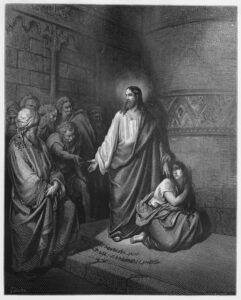
The poor Galilean peasant would hear it as good news (gospel), while the Roman in his villa would hear it with deep suspicion. (I know it’s an anachronism, but I can imagine Claudius saying something like, “sounds like socialism to me!”)
And that’s the challenge I face in reading the Bible. I’m not the Galilean peasant.
Who am I kidding! I’m the Roman in his villa and I need to be honest about it. I too can hear the gospel of the kingdom as good news (because it is!), but first I need to admit its radical nature and not try to tame it to endorse my inherited entitlement.
I am a (relatively) wealthy white American male. Which is fine, but it means I have to work hard at reading the Bible right. I have to see myself basically as aligned with Pharaoh, Nebuchadnezzar, and Caesar. In that case, what does the Bible ask of me? Voluntary poverty? Not necessarily.
But certainly the Bible calls me to deep humility — a humility demonstrated in hospitality and generosity.
There’s nothing necessarily wrong with being a relatively well-off white American male, but I better be humble, hospitable, and generous!
If I read the Bible with the appropriate perspective and humility I don’t use the story of the Rich Man and Lazarus as a proof-text to condemn others to hell.
I use it as a reminder that I’m a rich man and Lazarus lies at my door.
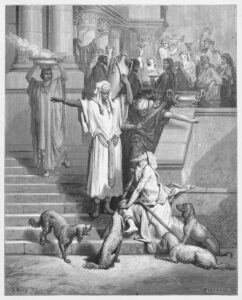
I don’t use the conquest narratives of Joshua to justify Manifest Destiny.
Instead I see myself as a Rahab who needs to welcome newcomers.
I don’t fancy myself as Elijah calling down fire from heaven.
I’m more like Nebuchadnezzar who needs to humble himself lest I go insane.
I have a problem with the Bible, but all is not lost.
I just need to read it standing on my head. I need to change my perspective.
If I can accept that the Bible is trying to lift up those who are unlike me, then perhaps I can read the Bible right.
4 Examples from Scripture
For the following 4 passages, try to answer each question as sincerely as you can.
Exodus 22:21-24
Isaiah 58:6–9
Psalm 33:10–15
Luke 4:18–19
1) How does this passage speak to those that are in power?
2) How does this passage speak to those whom have no power?
3) Imagine you’re the original audience of the passage. You’re either an ancient Israelite recently rescued from Egypt by God, an ancient Israelite being warned by a prophet, an ancient Israelite reading poetic language, or at the temple when Jesus is reading from the scroll. What promises/warnings is God making to you in that time and place?
4) How might someone in power, with much to lose, try to interpret these passages in ways that don’t require any change in their life or in society in general?
5) At one point, Brian Zahnd states, “I have to see myself basically as aligned with Pharaoh, Nebuchadnezzar, and Caesar.” Why is it helpful read Scripture with that in mind?
Prayer of Repentance and Lament Adapted from Carol Penner
You are the God who hears:
hear our prayer today for all who lament or repent.
For those among us who face discrimination every day
because of their skin color,
we lament.
For those among us with white skin who benefit
from racist systems oftentimes even without realizing it,
we repent.
For those among us who have struggled and waited so long
for the Promised Land of freedom and equality,
we lament.
For those among us who have acted in racist ways
and have hurt people of color,
we repent.
For those peacefully protesting injustice who face police brutality
and a justice system that hasn’t always been fair,
we lament.
For those who think racism is someone else’s problem,
and not a problem for humanity,
we repent.
God of hope, show us how to work for justice together,
standing up for what is right,
stepping in when something’s wrong,
shouldering each other’s burdens,
holding each other accountable,
righting the wrongs we’ve done,
speaking truth to power.
We pray for change, lasting change,
for protection for peaceful protesters,
for a de-escalation of violence
and for government leaders who listen.
Deliver us from evil, within and without,
in Jesus’ name we pray, Amen
Benediction and Commission By Connie Epp


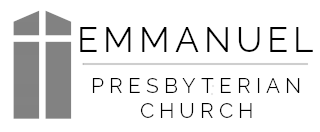


After today’s worship I will not ever read the bible the same way. As a matter of fact, I will never “walk” the same way.
Hopefully, I won’t become comfortably numb again.
You’re changing the way we see things. Thanks.
ps: Happy Father’s Day David.
pps: !
Yes, we as white Americans have been living a life of priviledge and relative wealth, that we have mostly taken for granted. I really like the reading/sermon excerpts for today, as we as Christians all need to think like the poor and trodden people, as Jesus would have. Very humbling.
I heard Al Sharpton on tv the other day and I couldn’t believe he said what I have been saying lately, when thinking about our Constitution, or the “American experiment”… The founding fathers state “all men are created equal”. However, they were all white, educated, priviledged, wealthy land/plantation owing men. White women were treated as property, as well as slaves who were brought over against their will to serve, like it or not. Women had to fight to vote; we’re still struggling for equal pay. Slaves had to fight to vote and black/Afro Americans are still waiting for their time, when “men” really globally means “human”. I hope & pray this is the time. Deb
Wow! I hate to say it, but it never dawned on me that the Bible was consistently written from the point of view of the disenfranchised. Even David as king often wrote his Psalms from a repentant point of view when he was “on top” and from an underdog point of view when he was low. Thanks so much for this perspective. As Barry said, I won’t be reading the Bible the same way again.
Very timely and on point, David. As a church and as a nation, I pray that the scales will be removed from our eyes and that we will be able to sit with the discomfort and be able to repent.
David – Thank you for the insightful sermon lesson. Appreciate you preparing the sermons each Sunday. HAPPY FATHER’S DAY to you.
WOW! GAME CHANGER for sure. I WILL be sharing this w/family & others. Thank you David for sharing these other amazing voices. Pat